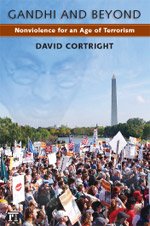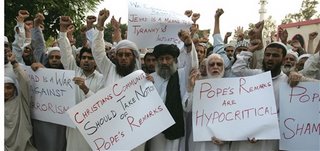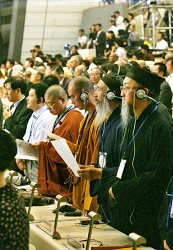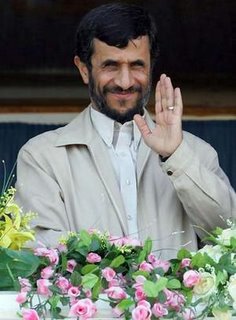 Despite several reservations, believing that dialogue even with those with whom we seriously disagree can be productive, I participated in a meeting with the Iranian president organized by the Mennonite Central Committee.
Despite several reservations, believing that dialogue even with those with whom we seriously disagree can be productive, I participated in a meeting with the Iranian president organized by the Mennonite Central Committee.
The meeting was so tightly structured that there was no room for individual questions. However, Robb Davis who chaired the meeting asked several tough questions on behalf of the group.
In the debrief meeting that followed, I said to my colleagues that I was very disappointed with his answers to two questions: one on the holocaust and the other on the State of Israel. However, I was pleased with his answers to the nuclear question. President Ahmadinejad came across as a deeply religious person and I am inclined to believe him that his nuclear ambitions are for peaceful purposes.
I am also pleased that he extended an invitation to religious leaders to continue the dialogue in Teheran. In a context of building distrust with the US government and impending military action such conversation, I believe is critically important.
The following is the press release from the Mennonite Central Committee
MCC Press Release
U.S. religious leaders meet President Mahmoud Ahmadinejad
Sept. 22, 2006
NEW YORK, N.Y. - Nearly 45 religious leaders from Christian and Muslim faith backgrounds met with the Iranian president, Mahmoud Ahmadinejad, Sept. 20, in an open discussion about the role religious communities can play in reversing the deepening crisis between Iran and the United States.
This was the first face-to-face meeting between the Iranian leader and leaders from mainline Protestant, Catholic, Orthodox, evangelical and historic peace churches. Much of the discussion focused on a mixture of religious and political issues such as the harsh language between the U.S. and Iranian governments, Ahmadinejad’s publicly stated position on the Holocaust and the role of religious groups in the nuclear weapons dispute.
The group met for about 70 minutes in a conference room Wednesday morning at the Barclay New York Inter-Continental Hotel, 111 East 48th St., where President Ahmadinejad was staying while in New York.
The event was organized and sponsored by Mennonite Central Committee (MCC), of Akron, Pa., a relief, development and peace organization of the Mennonite and Brethren in Christ churches in the U.S. and Canada.
“The Iranian government invited us to organize a conversation between religious leaders and President Ahmadinejad,” said Robb Davis, MCC Executive Director. “As an agency of one of the historic peace churches we viewed this as an opportunity to build mutual understanding between two peoples who have lived too long with mutual suspicion.”
Both Davis and Ahmadinejad opened the meeting with comments about their respective faith positions.
In a prepared statement, Davis focused on the need of religious leaders in the U.S. and Iran to pursue peace and encourage those in government to resolve differences peacefully.
“We believe that people of faith must come together to mend the breeches that exist and seem to continue to grow between nations and faith communities in this time,” Davis said. “This is why we are here—to talk, to raise difficult questions and to begin to build relationships that will lead to honest and open exchange to confront the very real divisions that tragically lead to animosity, hatred and the shedding of blood.”
Ahmadinejad said, "At any point in the course of history when a group of people anywhere in the world put their instructions into practice, they actually set themselves as examples of peace, order and progress and served as role models for ideal communities.”
Davis followed with a question about the language being used by the U.S. and Iran, such as President Bush referring to Iran as one of the “Axis of Evil” countries, while Iranian protesters march through the streets shouting “Death to America.”
Ahmadinejad responded by saying that “Death to America” does not mean death to the American people, but in fact Iranians love the American people. What it pointed to, he said, were problems with how U.S. government policy has negatively impacted the recent history of Iran from the Shah to the present crisis.
“There was no cause for anger as they are not addressed to the American nation but to the aggressive, unjust, warmongering and bullying U.S. policies,” he said. He later added that there are times when people need strong language to express themselves.
When asked about his controversial views related to the Holocaust, Ahmadinejad referred to previous statements in which he raised questions about the Holocaust and said there is need for additional historical research to be done about it.
He made a direct connection between the current conflict between Israel and Palestine and the Holocaust in which he said the Palestinian people are being asked to pay the price of the Holocaust. In this context “the Holocaust is a European problem not a Palestinian one,” he said.
Acknowledging the millions of people who died in World War II, Ahmadinejad asked why so much attention was being paid to those who died in the Holocaust and very little to the millions of other civilians who also died.
Davis told Ahmadinejad that more dialogue was necessary on this issue. In a discussion among the delegation members following the meeting some of the participants said Ahmadinejad’s responses on the Holocaust were less than satisfying, according to Davis.
On the issue of nuclear weapons, Ahmadinejad said, Iran is not producing weapons and has no need to. He also said that religious people should assume a role in monitoring the nuclear activities in all countries, including the U.S. and Iran.
Ahmadinejad suggested faith groups should join with scientists to visit nuclear facilities around the world to make certain countries are adhering to nuclear agreements.
“The president broke very little new ground in his responses but had some helpful suggestions for the role of people of faith in engaging more deeply around the issue of nuclear nonproliferation,” Davis said.
Toward the end of the meeting, promises of further discussion and a possible visit to Iran by a religious delegation were agreed upon by the delegation and Ahmadinejad.
“Come in winter when the nights are long and we can spend many hours discussing things,” Ahmadinejad said. Davis closed by saying that in the Christian faith tradition God calls on believers to pray for all leaders and that the delegation would be praying for Ahmadinejad and U.S. President George Bush. Ahmadinejad acknowledged the point and said he welcomed the group’s prayers.
For more information contact Mark Beach, MCC Communications Dept., meb@mcc.org, office – 717-859-1151 or cell phone at 717-203-7174.
 Despite several reservations, believing that dialogue even with those with whom we seriously disagree can be productive, I participated in a meeting with the Iranian president organized by the Mennonite Central Committee.
Despite several reservations, believing that dialogue even with those with whom we seriously disagree can be productive, I participated in a meeting with the Iranian president organized by the Mennonite Central Committee.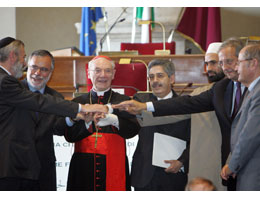 Rome’s Mayor Walter Veltroni (second right) reaches out with other religious leaders at the end of an interfaith meeting at city hall in Rome yesterday attended by (from left) Rome’s chief rabbi Riccardo di Segni, Community of Sant’Egidio president Andrea Riccardi, the Vatican’s top official for inter-religious dialogue Cardinal Paul Poupard, president of Rome’s Islamic Cultural Centre Abdullah Redouane, Imam of Rome’s mosque Sami Salem and Rome’s Jewish community president Leone Paserman
Rome’s Mayor Walter Veltroni (second right) reaches out with other religious leaders at the end of an interfaith meeting at city hall in Rome yesterday attended by (from left) Rome’s chief rabbi Riccardo di Segni, Community of Sant’Egidio president Andrea Riccardi, the Vatican’s top official for inter-religious dialogue Cardinal Paul Poupard, president of Rome’s Islamic Cultural Centre Abdullah Redouane, Imam of Rome’s mosque Sami Salem and Rome’s Jewish community president Leone Paserman